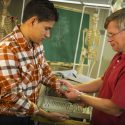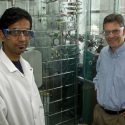Program bolsters number of minority engineering graduate degree recipients
Elizabeth Felton never thought about pursuing a Ph.D. when, in 2000, she began her master’s degree program in biomedical engineering. That changed during a gathering of the University of Wisconsin–Madison Graduate Engineering Research Scholars program (GERS).
There, Felton met a fellow student studying for the Ph.D. qualifiers, and she was convinced to give it a shot. It was good advice; in addition to completing her Ph.D., Felton is now working toward an MD.
Felton is one of many success stories to come from the GERS program, which strives to increase the number of underrepresented minority students obtaining advanced degrees.
Other GERS students have received national fellowship awards, including the National Science Foundation, National Aeronautics and Space Administration, National Institutes of Health, Nuclear Regulatory Commission, and the National Highway Institute fellowships. Several had competitive scholarships as undergraduates and achieved perfect scores on the quantitative graduate record examination.
GERS welcomed its first cohort of 14 incoming students, including Felton, in 2000 after a year of planning. Eight years later, 20 GERS students have obtained Ph.D.s and 38 have graduated with master’s degrees. Currently, nearly 50 students are involved in the program.
These numbers are significant: Before GERS, only nine graduate students of color were enrolled in the College of Engineering.
The increased enrollment has national significance. According to the 2005 Survey of Earned Doctorates from the National Science Foundation—which is the most recent data available—UW-Madison is tied for third for the highest number of female underrepresented minority doctorate recipients in engineering.
GERS encourages students to pursue faculty positions after obtaining their doctorates. Four GERS alumni are in faculty-track positions, two are postdoctoral fellows and seven are working in government laboratories.
“In the faculty and postdoctorate ranks, there is a shortage of minorities. We need to increase the numbers, which means getting students doctorate degrees,” says engineering physics Professor Douglass Henderson, who co-directs GERS along with Graduate Student Services Coordinator Kelly Burton.
“UW-Madison can play a large role in the production of faculty and postdocs. We have faculty with pioneering research and students trained in these areas are very attractive to other institutions,” he adds. “Our culture is diverse, so why is diversity lacking in higher education?”
GERS focuses on retaining minority graduate students by providing a sense of community and eliminating the sense of isolation that underrepresented students often feel.
Felton recalls that she was nervous coming to UW–Madison. After earning her bachelor’s degree from Northwestern University, she’d spent a couple of years working. She was worried about becoming a student again — this time at a larger institution where she knew no one.
“GERS really made that transition a lot easier,” she says.
GERS has meetings twice a month to give students a chance to get to know each other. The meetings sometimes include professional development sessions, but the informal, social potlucks are the most popular.
The GERS community also includes College of Engineering faculty. Burton says the interaction faculty members have with GERS students in their labs opens their eyes to the minority experience on campus. This in turn helps faculty members understand the experience of undergraduate minorities in their classrooms.
“GERS works because it is administered by the faculty-it is owned by the faculty,” says Burton, explaining the central piece of the program is the faculty committee that originally developed and implemented the program.
UW-Madison Provost and Vice Chancellor for Academic Affairs Patrick V. Farrell was one of the original committee members. “GERS illustrates the key elements graduate students need to have to be successful,” he says. “Successful graduate students get supported.”
The success of minority graduate students also has an effect at the undergraduate level.
“Undergraduate students are looking for visible success stories. Here’s a cohort of graduate students who can act as mentors or models,” says Farrell.
Based on the College of Engineering model, other colleges at UW–Madison are implementing programs similar to GERS. The College of Letters and Sciences has a graduate research scholars program, as does the School of Education. The College of Agricultural and Life Sciences and the School of Medicine and Public Health also have formed a joint program, and other campus units are exploring the idea.
Tags: diversity, engineering, Graduate School, learning



